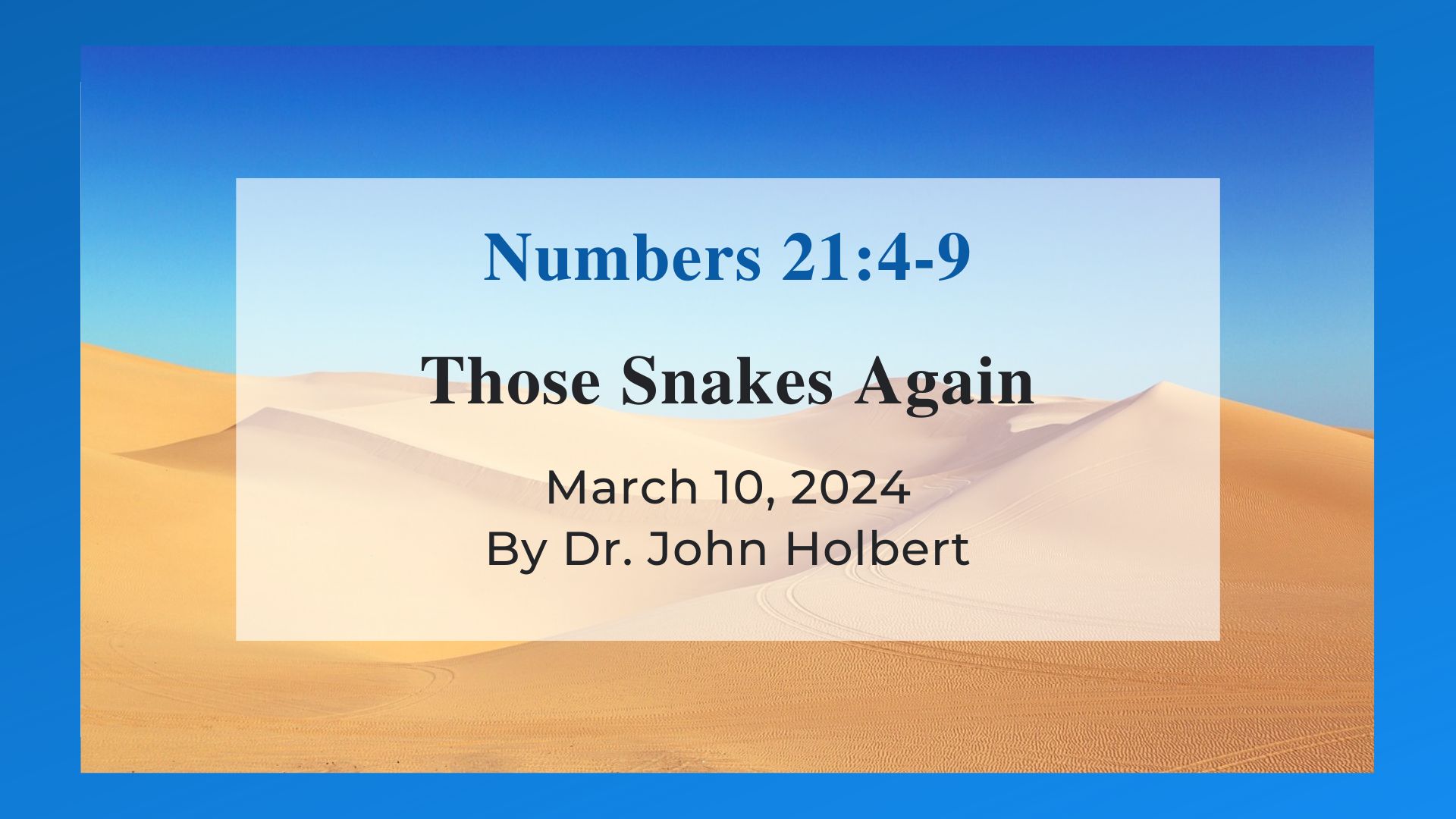Those Snakes Again - Reflections on Numbers 21:4-9
by Dr. John Holbert on Monday, March 4, 2024

Those Snakes Again
Numbers 21:4-9
The Peripatetic Hebrew Bible Preacher
Passages like this one often create more trouble for preachers than offer enlightenment to their hearers. Whenever ancient magic is involved, parishioners, post-Enlightenment persons, begin by asking the wrong questions: “What sort of snakes were these?” “Where did this happen?” “Why can I not find a cure for my illness by gazing at something provided by God?” And, of course, those more conversant with the Bible will point out that John 3 refers to this passage allegorically by claiming “just as Moses lifted the serpent in the wilderness, so must the Son of Man (the “human one?”) be lifted up that whoever believes in him may have eternal life” (John 3:14-15). Allegorical interpretation, a method of reading long used in Bible interpretation from its earliest days, is rarely found persuasive in our time, the problem being that anyone can make the Bible say whatever they want, limited only by their wild imagination. Indeed, more than a few modern biblical mountebanks have grown rich employing their unchecked allegorical readings of the ancient text. They may be found on TV, spouting their drivel and trolling for cash.
So, what are we preachers to do with this tale of fiery serpents and sympathetic magic? It turns out that there is something unique about this story, coming as it does in a book filled with the grumblings and complainings of the wretched people of God: this may be the only time in these complaining stories, beginning in Ex.17, that the people overtly reject something originally given to them by their God for their sustenance, namely the wonderful manna that made possible their survival in the wilderness. We remember, with considerable pleasure, that God provided this sweet substance for them at their request, and upon seeing it they said, “manna?” which means in Hebrew “what is it?”
Well, the people have apparently tired of the “what is it” stuff, there being perhaps only so many ways one can prepare it—boiled, seared, flash fired, etc. So they say to Moses, and through Moses to YHWH, “For there is no bread and there is no water, and we loathe the wretched bread” (Num.21:5). The sentence appears decidedly odd. They first say that “there is no bread,” but then conclude that they “loathe the wretched bread.” What can they mean? The sense is perhaps better expressed in Hebrew by translating “our very selves,” a rendering of the intensive form of the first-person plural pronoun. And the familiar word nephesh is used in this intensive form, a word that has several meanings. It can indeed be the first-person pronoun, but it can also mean “appetite” or “throat” (its common translation as “soul” is very unhelpful and misleading). Might the people be saying that they literally wretch or vomit when they try to swallow this manna? What was intended by God to save them has in their minds made them sick.
When they complain like this in other places, God may be displeased, but instead of fury against them offers them quail as a way to supplement their survival diet. But here, YHWH is having none of that; God determines to coddle them no more, sending “fiery serpents” to harass, bite, and eventually kill them for their obstinant rejection of God’s provision of food. The people soon realize that their grumbling against God and Moses has gone too far this time, and they beg Moses to intercede on their behalf. Of course, this is hardly the first time that the lawgiver has done so. In the famous and astonishing tale of Ex.32, Moses confronts God directly on the sacred mountain, debating with the deity that the people must be spared, lest the Egyptians think YHWH to be some capricious fool, bringing Israel out of Egypt merely to slaughter them in the mountains! So, Moses knows intercession with God!
This time, he, at the instigation of YHWH, makes a bronze snake and puts it on a pole in order that any bitten Israelite might look at it and survive the snake bite. What Moses makes is based on a Hebrew pun: the word for “snake” and the word for “bronze” are close in the language, so Moses makes a bronze snake, a nechash nechoshet, as a way for the people to live.
How might that peculiar tale add to our portrait of God we are assembling this Lent? It might be said that our God is no pushover God, forever saying, “There, there, my people. Just do whatever you like, and I will love you always anyway.” God will surely love us always, but love is not in every case an easy ride. God is demanding, as the ten words of last week announce, as Jesus will say about becoming his true follower. It requires self-denial and a free acceptance of the cross that Jesus chooses. Magic and sympathetic snake poles aside, this God brooks no simplistic religious twaddle, but a full acceptance of the grace of God, and a full sharing of that grace with God’s world.
